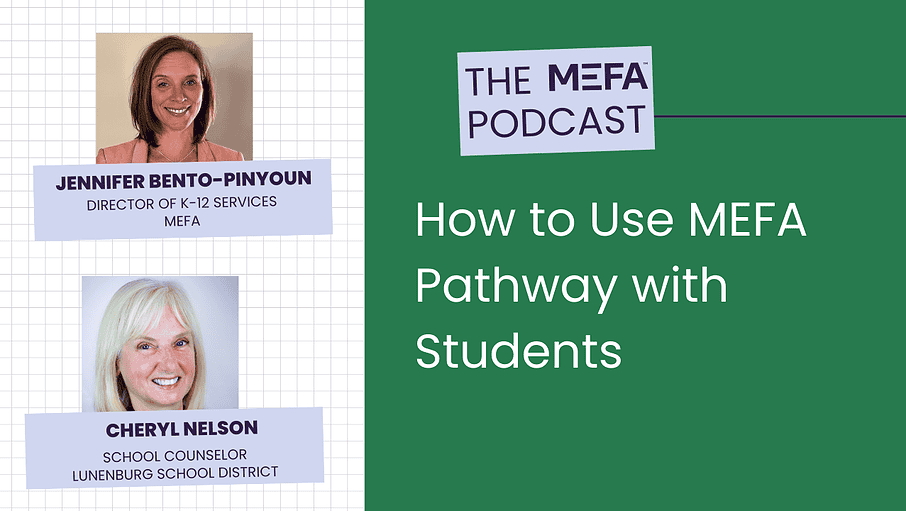Resources Mentioned in this Episode
Jonathan Hughes: Hi everyone. And welcome back to the MEFA Podcast. My name is Jonathan Hughes. Well, we have a great show. Once again, for the second week in a row, we are going to have two guests on our program. Later on, on the show, we’ll hear from the Lunenburg High School Counselor, Cheryl Nelson. She’ll talk to us about using MEFA Pathway, MEFA’s college and career portal, and everything that she loves about using it.
But before that, joining us right now for the first time on the show, is the Director of MEFA Pathway, Jennifer Bento-Pinyoun. Hello.
Jennifer Bento-Pinyoun: Hi. Thanks for having me. What an honor to be part of the podcast. Thank you so much.
Jonathan Hughes: Well, we’ve been looking forward to having you on ever since we started this show. And so I’m glad that you’re finally here.
So I mentioned right up the top, of course MEFA Pathway, and that it’s MEFA’s college and career portal. But for anybody listening there at home who doesn’t know about MEFA Pathway, can you just explain it briefly to everyone?
Jennifer Bento-Pinyoun: Sure thing. So, yeah. So MEFA Pathway is a complete comprehensive web based portal that’s open to students in grades six through 12. It’s designed for career exploration and discovery with a fun, engaging, intuitive, colorful interface. So it appeals to all students. The platform offers age appropriate activities and content that aligns the student on to help them with their post-secondary planning.
Julie Shields-Rutyna: So I know we’re going to hear from Cheryl Nelson a little bit later on how she has used it at her school as a school counselor and had her students using the portal. Can you also just touch upon some of the ways that students and families can use their site, even if the school doesn’t.
Jennifer Bento-Pinyoun: Sure thing. So again, the portal is available for students, opened in grades 6 through 12. So any student can register as a new user, regardless of if their school uses the platform. And we currently have 109, what we call affiliate schools in Massachusetts that have embraced MEFA Pathway.
They’re, you know, integrated into their curriculum. So any student can use the platform. They sign in and register as a new user. They all have access to all of the features within the portal. We have a dashboard that lends itself to helping the student through steps, through that journey.
If a student creates an account in grade six, seven, or eight, a lot of what they start to build on within the platform transitions with them to grades 9 through 12. And Cheryl will talk specifically about how Lunenburg district uses the site in that capacity.
Jonathan Hughes: And when you say, you know, in a school system or in a school district, can you explain that a little bit? Like how would it be used and how would counselors, what kind of things would they be able to check on and measure and things like that for their students who used that?
Jennifer Bento-Pinyoun: Sure. So one of the first activities that we encourage students to start working on within the platform is the resume builder.
So when the student first registers as a new user, they can go in and start working through their profile details. So this includes the student adding sports clubs, activities, community service certifications, all of which they can build on as they move through middle and high school and all of that.
These profile details will lend itself to a resume builder feature. So the student can then create as many drafts of a resume for whatever purpose they need that resume for, whether it’s for a college application or a job. They would just add the objective if they like, they can select what they would like to appear on that particular draft, they can even select a different template.
We have two templates that are available. And then they save that draft and they can go back to that particular draft whenever they like. They can download as a PDF and or a word. And obviously, if they’re downloading as a word doc, they can manipulate it from there.
They can change the order, change the thought. So that’s one of the first things that we encourage the students to start working on. And again, they build on that through the grade levels. We also have a number of assessments within the website that the student can start to learn about themselves.
What are their interests? What are their values? What are the different skills that they’re adept at? And then tie assessment results into that career search that career exploration to start learning about what might be a good career path for them after high school. And we do encourage because we know that not every student is on the same path.
MEFA Pathway allows for so many different options, whether that’s going directly into the workforce, or if the student’s going to take a gap year, or potentially go to a community college or a four-year college. So the platform really embraces all of the different options that a student may have.
Julie Shields-Rutyna: You know, that’s funny that you say that Jen, because when I talk to school counselors, they many times say how they want to make sure that they are able to support all of their students with all of their different plans.
And can you tell us just a couple of specific ways maybe that have MEFA Pathway, you know, offers things to students who don’t necessarily have a four year college in their.
Jennifer Bento-Pinyoun: Absolutely. So the career piece within the platform is quite robust. So the student can actually go into this career search page and select different criteria that might be applicable to them.
So if they’re a student that would like to look at a certification program or a two year degree, they can put that particular filter on the career search, and that will get a list of careers based upon that filter. And then they can select a career that looks like something that they may want to learn a little bit more about and read about that career.
A lot of the careers that appear in the website have a link to a little 90 second video. So the student can actually click on the video and listen, you know, cause maybe they don’t want to read about it. They might want to listen. And they can listen to hear what, you know, what a registered nurse does in a day in a quick 90 seconds.
All of the information on the careers comes from a recognizable database and updated regularly. So all of the information on the careers is up to date. So we’re also looking at and encouraging students to once they start exploring and discovering different potential options for themselves.
They’re starting to create a career list within the platform, which they can edit and remove careers as they go along. And what we also encourage them to look at, is what’s identified in each of the career details is a career category or also known as a career cluster.
So once the student is looking at their list of maybe they have 25 careers on their list that they’re potentially interested in. They look at that career category column and say, wow, well, I’m seeing that I have a lot of careers in that STEM category. So then they can kind of narrow down a path for after high school.
Jonathan Hughes: You know, as you’re talking about this, I realize that oftentimes I find it hard to keep up with all of the new things that are on MEFA Pathway. Because every time I look at it, there are a bunch of different new tools and capabilities and resources that students can use. I was wondering if you could tell me and everybody else, how the site has grown since its inception and what are some of the biggest and most important additions since it was created. And maybe some of the most recent.
Jennifer Bento-Pinyoun: Sure. I will just say it’s amazing how we’ve grown over the last couple of few years. And a lot of our changes and enhancements are directly a result of our user feedback. So one of the most recent is that we have Common App integration, which is amazing.
I say recent, we are actually going into our third year, so it’s not that recent, but we do have one feature that is going live for this season and that’s the parchment capabilities. So if a Pathway is a Common App on, in parchment partner, and so our affiliate schools have the option to integrate with Common App and parchment, which streamlines the college application process for students.
So the student will still would still work in Common App, but manage their non-common app and common app schools in the MEFA Pathway Dwight platform. Additionally, on the counselor side, it makes it, they are right in MEFA Pathway counselor portal, and they’re doing all of their work submitting score ports and forms all through MEFA Pathway.
So that’s been an amazing enhancement that we’re super proud of.
Jennifer Bento-Pinyoun: Another enhancement that we’ve seen over the last couple of years has come out of an initiative of the Executive Office of Education. So it’s called the MassTransfer Feature, and this is so fun for students to use.
So this allows the student to see how they can save on the cost of education by taking advantage of one of the three of the MassTransfer programs. So there are three programs. There’s the Commonwealth Commitment, the Gen ED Foundation, and the ADB program. So each of these programs within MassTransfer have different estimated savings.
So in MEFA Pathway, there’s a calculator where students can select from a list of participating community colleges, and then they select from a list of public colleges. And then once they select that community college and the public college, the system will bring up the three programs and show the estimated savings.
So then the student can save that plan and apply the plan to either the college compare and or the college cost calculator. So then they can see the savings of taking advantage of one of those plans. So it’s pretty remarkable.
Jonathan Hughes: I like that tool. I remember testing that, that was really exciting. Now you mentioned the college compare. What is that exactly?
Jennifer Bento-Pinyoun: Oh, the college compare. Fabulous. So we, so the college compare, we suggest that students, you know, in their junior year especially, they’re thinking about, okay, maybe I have a list of 20 schools that I’m thinking that I want to apply to. The college compare can really help the student decide what schools that they will actually apply to.
So they can select up to five schools side-by-side. And when they do so, it generates a chart where it shows academic information and financial information from each of those schools, and then they can really start creating a list for themselves of those target, reach, and safety schools, so where they fit into each of those schools. So they can save a chart, a comparison chart, save as many as they like and come back to that at a different time or they can, you know, just keep creating those combinations. 1,000,001 combinations.
Julie Shields-Rutyna: So fun. Yeah. So if, what would you say if someone wants to get started? Someone is listening to this today, a student who wants to get started, or a parent who wants to share this with a student, just what would they do?
Jennifer Bento-Pinyoun: Oh, it’s so easy. Go onto mefapathway.org Click “I’m a student”. Register here as a new user. Go through the registration process. It’s super easy. The student will select the city or town that they are located in. And then they will see all of the schools within that city or town. So select your school, create a username, create a password. Don’t forget it.
Create your two security questions. So just in case you forget your password, you can reset that and you’re on your way. You’ll be brought to your dashboard and you can start working on the profile details and take advantage of all the great features within MEFA Pathway.
Jonathan Hughes: Well, thanks, Jenn. And I know, you know, we’ve talked a lot about all the great things that Pathway does, but I know there’s even more than that, that we haven’t talked about.
So if you want to go in and we would be here for an hour, I think talking about all the things that that Pathway has to offer. So if you liked what you heard so far and you want to see what else is available on the site, go on, as Jennifer said, and create an account. So thank you so much for being here. And I hope it’s the first time of many.
Jennifer Bento-Pinyoun: Absolutely.
Jonathan Hughes: So will you stick around while we answer a question from the mailbag? Okay, so now we’re moving to the MEFA mail bag. And these are questions that have come in from customers over the past two weeks and answered by our college guidance experts. And remember, if you have any questions, please reach out to us at [email protected].
Or you can call us at 1-800-449-MEFA. You can also reach us on social media at Facebook, MefaMA. And on Twitter at mefatweets. Okay. So today our question comes to us from a high school counselor actually, in Massachusetts trying to counsel an international student. And I like this question, and then we’ll give you a lot of time.
So he writes, I have a senior who transferred to our school from his high school in India at the start of junior year. He’s been living with an uncle and aunt in town, as he completes high school in the states, I would have to double check the guardianship situation for him. But as I encouraged him to complete the FAFSA with him looking to attend college in the U.S., I wasn’t sure how to best guide him.
If his uncle has guardianships, then maybe the uncle’s financial information would be required. But if not, maybe it goes to the parents. Granted they’re back in India, still working there. Just trying to help guide him as best as I can, but it’s not a situation I’ve worked with a lot in the past. Thanks for any insight you can provide.
So there’s a lot here.
Julie Shields-Rutyna: There is. There really is. And this would be a perfect question where I would want to have a longer conversation with, really with the student, I guess. But let’s touch on a few points. So I guess the first point is to apply for federal financial aid using the FAFSA.
Yeah, a student needs to be a U.S. citizen or permanent resident. There are also a couple of a few, non residency eligibility statuses. And you can find those at studentaid.gov. There’s a list of, you know, students who are in asylum and a few things like that, but in general, you have to be a U.S. citizen or permanent resident to be eligible for federal aid and complete the FAFSA.
So that’s the first thing I would just want to make sure of the student’s citizenship status. And then secondly, if the student does qualify, then it’s really the parents, the FAFSA wants the parents information on the form. So it doesn’t matter that he’s living here with an aunt or an uncle or guardian.
It doesn’t matter. It’s the parent’s information that would go on the form and because the parents are back in India and working, what they would really have to do is just translate their income into us dollars. And that’s the information that would be required on the form. Anything else you think we could add about that one, John?
Jonathan Hughes: Yeah. There is one other thing I would say. There’s one facet of this that I would bring up, is that if you’re going to be completing the FAFSA online, you have to have a social security number. And if you are living in India and you’re not a U.S. citizen or permanent resident, you don’t have a social security number, and you wouldn’t be able to file this form electronically.
So the student would, I think file the best that he could. The parents can supply this information and provide a signature page, right? They would have to sign up a signature page and send it in. So it’s a bit of a process in this case, but it’s what you would have to do technically, practically, to file the application.
Is that correct?
Julie Shields-Rutyna: Well, the parents who are, if the parents are not U.S. citizens, they would put zeros in the social security number field
Jonathan Hughes: They can’t get an FSA ID. Correct.
Julie Shields-Rutyna: So they would just put zeros in the social security field and then they complete the form. But at the very end, they wouldn’t be able to electronically sign it.
So they just print the signature page and mail it into the address on that page.
Jonathan Hughes: Perfect. And then that guy said, I would only say one other thing too, which is, this is probably going to be one of those situations where the student is going to be contacting the financial aid office at a certain point.
And so as we know, a lot of financial aid comes from colleges and universities themselves. So if the student maybe wasn’t eligible for the federal or state government, due to citizenship issues. You may want to talk to the college because any financial aid that he’s going to receive would come from the college at this point, or if there is issues regarding the international income, et cetera, he’s probably going to be wanting to contact the college at a certain point.
All right. So that was nice that this is like stumped the band, you know, but it’s something. Remember, if you have any questions you can call us up at 1-800-449-MEFA or you can email us at [email protected]. We have a bench of college guidance experts waiting to answer your call.
Now let’s head to my interview with Lunenberg Guidance Counselor, Cheryl Nelson.
Cheryl Nelson has spent 25 years as a guidance counselor in the Lunenburg public school system where she currently counsels eighth and ninth graders. She has agreed to talk to me about her job and about MEFA Pathway, which is used in the Lunenburg school system as a tool, about which she is quite enthusiastic.
Cheryl, thank you very much for joining me here in the MEFA podcast. And I mentioned that you are counseling eighth and ninth graders right now, have you always counseled eighth and ninth?
Cheryl Nelson: Middle school has always been my niche. I was assigned in 2005, there was a brand new primary building.
And there really weren’t enough counselors in the district. So I was commissioned to be there part-time for pre-K, one, and two, and then go to the middle school, which at the time was 5, 6, 7, and 8. So I was half the week, half the day at one school and half the day at another, that went on for about a year or so.
That was quite an experience. It was different being with younger children who, you know, they’re real messy when they eat lunch and all that kind of stuff. So that was good too. I mean, I was glad to be back at the middle school though after that first year.
Jonathan Hughes: What do you think people would be surprised to know about counseling eighth and ninth graders?
Cheryl Nelson: That they are just as needy as toddlers. That’s what I would say. In a very different way, but just as much in need of direction and guidance. Common sense, every day kinds of thinking. So when MEFA came along, that was a great opportunity to be able to fold in real life. Like this is what life is like as an adult, you know? So it was a good connection.
It made sense to me. I wish it was something that I had when I was younger. It might have helped me be clear in my direction.
Jonathan Hughes: Can you tell me how you do use, I mean, for people who don’t know what MEFA Pathway is, you know, I can explain it, but I was wondering if you could explain it and then how you actually use it.
Cheryl Nelson: Well, it’s an online tool portal that schools can register, I guess work, for free.
It is a place where students kind of keep a portfolio of their interests, their test scores, their colleges that they’re interested in going to, any awards and things like that, and kind of pull it all together so that they can, when they leave high school, they have some kind of direction. Or at least there’s a place where everything’s collected.
I find that the MEFA has flexibility in the way that it’s set up. I can make my own lessons using different parts of it, depending on where the kids are at. So it’s not so cookie cutter for younger kids. And then as they grow, get into high school courses, they do a lot of the same things.
You know, their jobs, record their grades, put their interests in there. And then from time to time do some serious. Because MEFA has a wonderful, it’s just a wonderful resource to connect to occupations and in schools and make that connection for students of where they plug in, where they would fit best.
Jonathan Hughes: Which features do you use for the grade eight and nine?
Cheryl Nelson: The grade eight mostly is because I’m in the classroom with grade eight. So grade nine, I’ve barely scratched the surface. But with grade eight is where I’ve introduced students to it and get them registered and familiar with the site and how it works. And the tabs took me a little bit to get used to that, pretty much take them through the building profile and explaining to them what that’s about and that that’s a place where they can go and add to anytime.
I encourage them to go in there at least a couple times a year to update it. So the profile is the very first thing. And then do some of the interest, I think the interest and the values. And it’s interesting that one of the things that MEFA has is the learning styles. And that’s something that I’ve been doing with seventh and eighth grade for a long time, is teaching them about how they learn and why it’s important to know how you learn and what strategies do you use and all that.
There’s a, what’s it called? EDUeducationplanner.org is linked into and that’s the exact site that I was using before. So like I said, it just felt like going home when I learned about MEFA, it was very comfortable.
Jonathan Hughes: You use that tool to help students recognize the best ways that they learn, the ways that they’ve learned that are particular to each one of them. Is that right?
Cheryl Nelson: Right. So they’re individual, they’re learning about who they are as individuals, and that they’re not all the same and they don’t have to be all the same and it’s good to be different. And it’s good to find out where you’re with, what things are you good at? They don’t really know. I haven’t really explored a whole lot unless they’re in sports. A lot of kids want to be professional athletes, and you know, so it’s just a way, it’s a beginning, a starting point to have conversations, what do you dream about.
Jonathan Hughes: Yeah. And you mentioned learning styles, you mentioned values. Is that right? And then the third one that you mentioned was,
Cheryl Nelson: What things are they interested in? Where do they like to spend their time?
And all these things kind of overlap, you know, a kid who’s hands-on probably likes to be outdoors and active. You know, not so much in the books all the time, but you never know. The more interest that they have, the more flexible they will be.
Jonathan Hughes: Now, if you had to recommend MEFA Pathway to other educators, in terms of getting students to be engaged, what tips would you give them?
And then follow up on that, especially at the middle school level. You know, we know how important it is to have parents involved in MEFA Pathway as well. So what tips would you have to engage parents, and then for educators to engage their students?
Cheryl Nelson: Well, for educators, I think for any school system is going to embrace MEFA, which I don’t think my middle school principal.
This has been a year like no other, can we say that? So there’s been kind of new, and where I’m half in the middle school, half in the high school, my office is in the high school. I don’t see my middle school principal. So that being said, he’s not really that much aware of it. And our high school was just getting the training for the medical just prior to the pandemic.
I wish there was more time that it could have gotten solidified a little bit better, but what I see would envision the best thing would be for administrators to really understand what it is and the value of it. Because without the support of administration, I think it’s really hard.
I was lucky enough to be in the classroom regularly with eighth graders, so that I was able to introduce it to each eighth grader, to get them registered and on their way in preparation for ninth grade. The ninth graders, again, this year, the ninth grade, half of them I didn’t see half the year because we were remote.
So we’re trying to do this, you know, remotely registered for MEFA and find out what it’s about. It was kind of difficult. So that the freshman class, I could only go into their advisory and catch the ones that were not already registered and try to catch them up to speed. Other than that, they’ve had no other exposure, which is sad.
I think if educators were informed and embraced it as well as maybe taking a piece of their curriculum and blending it in somehow, or at least talk the same language, you know, at least ask the kids, you know, have you updated your path? Have you updated your profile yet? That would be good to include or that’s a strength that you have.
I think you should write that down in your, you know, in your profile. I think that if the educators had that kind of connection with it, that it would be a very, very helpful tool because it would be that common denominator that’s across grade level, that’s across content area, that’s talking about the student.
Why does this matter? The kids always wonder why. What do we have to learn this for? And precisely, you know, introducing eighth graders because they’re getting ready for high school. And high school is different than middle school because in middle school, you know, colleges aren’t going to ask for your middle school transcript, but they are going to look for your high school transcript and they are going to look for a diploma that you graduated high school.
You do that unless you have earned enough credits and you can’t earn credits unless you do the work. So we talk about the job of school. This is your job right now. And you’re getting paid in grades. The flip side is it’s not really all about the grades either. I wouldn’t want to put so much emphasis on the grades as much as the learning, as the much as achieving that you’ve passed the course.
You’ve passed the bar, you’ve passed, and you’ve earned that credit. Now you’re ready to go onto the next step. So the other thing about MEFA, I believe we haven’t yet done it, but I believe our program of studies, the school’s individual program studies can be loaded on so that particular school can bring the kids to, and I bring them there from the website, from our school’s website, and introduce them to that program of studies.
This is the game plan for high school. It’s a brand new game. You open the box, you read the directions, you find out the rules. You know, you look at the strategies. This is a game. You have four years to complete this game. Cause that they can relate to, you know, that they’re playing video games and things like that all the time.
So if they understand that, but this is a real life game. The time is ticking. It’s going, you’re on the clock.
Jonathan Hughes: Is there a feature in MEFA Pathway that you think is the most valuable feature?
Cheryl Nelson: Yeah. Just the fact that it’s so accessible. And it’s a place to collect a lot of information. And you can pass that on from one counselor to another.
That is a very useful tool, if you will. The specific part that I like introducing kids to is the career search and how to match up with their, how different ways that they can look up different things. But if they take their interests and their values and look to see what kinds of jobs in what cluster, at least get an idea as to the direction.
So that when they’re, you know, sophomore, junior, senior, they can match up with schools. I mean, even getting to that point where, when you’re now connecting with schools, what part of the country do you want to go to? You know, where do you want to live? You know, there’s all of that. That’s at the fingertips.
I think that’s just such a great tool. I think the kids like having the career center. I think they also like being able to have a place to put some of their accolades or if they have honors or awards, it’s a place like, oh, okay. I can put that there. And I talk about not just in school, it can be outside of school. You’re in a fencing competition and put it in there.
Jonathan Hughes: It helps students to plan for college, certainly, but also helps them to build a plan. Their career, if they’re not going to college, whatever it is that they are going to be doing after high school, you know, the idea is just to have a plan in place. Do you find that MEFA Pathway helps with that aspect as well?
Cheryl Nelson: Yes, because now we talk, we don’t talk about college and career readiness. We talk about what’s your path. So you don’t like school. Okay. What do you plan to do, you know. What are your options? You know, you don’t have to go to college.
You can, you know, explore careers that don’t require a college degree. And so by going through the process with MEFA. The career search, it has the grids that show, you know, so many percent have a high school diploma or need high school diploma versus a bachelor’s or associate’s, or, you know, for further education.
That’s one of the questions when they are looking, what education or training do you need? Some kids are pretty much sold on, they’re just going to do what their parents do because their parents have a business and they’re just gonna, it’s gonna, you know, fall in their lap, so to speak. And so my question to them as well, what skills do you think would be helpful to have to actually do that job.
And how are you going to acquire those skills? And if you did decide to go, if you are going to take over a business, don’t you think it would be a good idea to know how to run a business? Like having a business courses or some business degree might be helpful unless your parents are really good at training you how they do it, you know?
So just get them thinking about, you know, okay. Go with what they want. See where it takes me, if it has something to offer along the path. It’ll talk about where the jobs, you know, what are the related fields, maybe that if they don’t want to do that, they go off and do something else.
Jonathan Hughes: And there’s that resume builder too. Right.
Cheryl Nelson: And that’s the other key I show the kids. Everything goes into this, so that when you graduate high school, you will have a resume to go to work. If that’s what you want to do, you can go knock on doors and all the power to you, that’s great. And some people start that way and they get taken under somebody’s wing and they become an electrician or they become, you know, it depends on what their work ethic is really when it comes down to it.
Jonathan Hughes: Do you notice a difference? You know, when kids get to ninth grade, is there like a new stress or something or a new focus that they have? Like going, I’m in high school and I am buckling down and I have to start, you know what I mean? Like the class selection is important, now they have to start picking around classes. You have to start doing it.
Do you notice a difference between the eighth graders and the ninth graders I guess is my question.
Cheryl Nelson: Yes. And I think part of it is not so much about the change in the school, it’s their growing up is happening so fast developmentally at that age. And it’s a good thing, but they’re not eighth graders any more than they are, you know, ninth graders.
Most of them come down a little bit and, you know, they’re ready, they’re ready to kind of buckle down. I noticed that kids who did grasp the MEFA program and what it’s all about really embraced, you know, think about their classes a little bit more seriously. So I think if they understand the purpose of the game, you know, this is high school, that they’re going to take it much more seriously.
But then again, those could be kids that are just more focused and know what they want anyways.
Jonathan Hughes: Cheryl Nelson, thank you very much for joining us and thanks for talking about MEFA Pathway.
Cheryl Nelson: You’re very welcome. Thank you.
Jonathan Hughes: All right. Well, that is our show. Everyone, Julie, as always. Thank you for joining me. And thank you, Jen, for joining us. So remember, if you liked the show, please follow us on Spotify, Apple podcasts, or wherever you’re hearing this. And if you could do us an extra favor and give us a five-star rating, that would make us very happy.
Until then. Thanks everybody.











